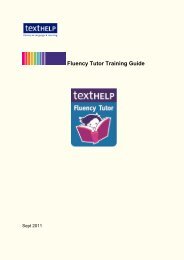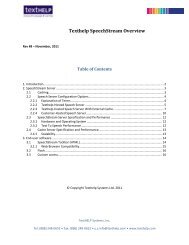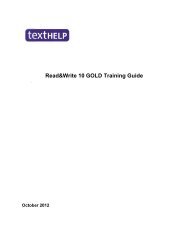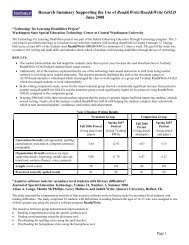01 NRDC Dyslexia 1-88 update - Texthelp
01 NRDC Dyslexia 1-88 update - Texthelp
01 NRDC Dyslexia 1-88 update - Texthelp
You also want an ePaper? Increase the reach of your titles
YUMPU automatically turns print PDFs into web optimized ePapers that Google loves.
62<br />
Research Report<br />
While the DDAT evidence might support the conjecture that a cerebellar deficit is causal, we<br />
have yet to find out whether the finding can be replicated with a more rigorous research<br />
design; the study has come under criticism from several quarters (e.g. Rack, 2003; Richards<br />
et al., 2003; Singleton & Stuart, 2003; Snowling & Hulme, 2003; Stein, 2003) although its<br />
methods have been defended (Nicolson & Reynolds, 2003a, 2003b).<br />
If it should be established that the cerebellar deficit is not causal, it might nevertheless be<br />
the case that the cerebellum plays a co-ordinating role in the processing of speech<br />
production at the interface of cognitive and executive functions (Silveri & Misciagna, 2000), in<br />
which case a causal direction would need to be established for any functional abnormality<br />
(Beaton, 2002). Future research might also have to eliminate possible alternative explanations<br />
such as attentional difficulties, general language impairment, or less specific<br />
neurodevelopmental problems than the dyslexia construct implies (Bishop, 2002). Meanwhile,<br />
there appears to be no support for the cerebellar deficit hypothesis when causal theories are<br />
compared (Ramus et al., 2003a; Ramus et al., 2003b).<br />
Importantly, we do not know yet how far cerebellar impairment might explain the problems of<br />
every person with dyslexia (Fawcett et al., 20<strong>01</strong>). As Aristotle was among the earliest to point<br />
out, with reference to the fallacy of division, what may be true of a group of people is not<br />
necessarily true of every member of the group. Among the individuals in one study, the<br />
dissociation between those with and without IQ-discrepancy on the static cerebellar tests was<br />
not complete (Fawcett et al., 20<strong>01</strong>). This suggests that, as the ‘core’ deficits predicted by other<br />
theories of dyslexia are not sufficient at group level to differentiate between dyslexics and<br />
ordinary poor readers (Fawcett et al., 20<strong>01</strong>), so evidence of a cerebellar impairment may not<br />
do so at the individual level.<br />
It is unclear whether cerebellar abnormalities are causes or correlates of dyslexia.<br />
Even if cerebellar abnormalities are found to cause reading difficulties for some people,<br />
they might not explain every case of reading difficulty.<br />
<strong>Dyslexia</strong> and processing speed: the temporal processing deficit theory<br />
Introduction<br />
There is a plausible link between hearing impairments and reading problems. Hearing<br />
provides inputs to information-processing; this in turn yields phonemic categories, which are<br />
important to speech perception; damage to the auditory pathway leads to degraded signals,<br />
with a possibility of corresponding degradation in phonemic representation; and language<br />
problems with their roots in speech perception and production will be the result (Farmer &<br />
Klein, 1995).<br />
In a hierarchy of temporal information-processing functions, timing may be critically<br />
important (Farmer & Klein, 1995). At the lowest level of the processing hierarchy are target<br />
detection and identification; at an intermediate level are individuation and temporal order<br />
judgement in both auditory and visual domains; at the highest level is complex sequencing in<br />
both perception and production. Deficits might be interpreted in terms of rate of processing,<br />
‘smudging’ of encoded information over time so that mental representation loses crispness of<br />
input, or to ‘temporal jitter’ where the times assigned to events or their properties are
















